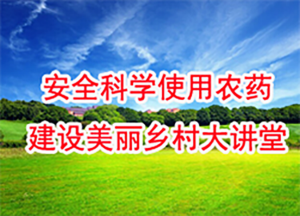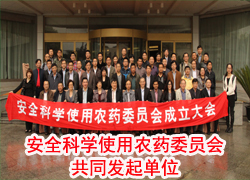
Dr. Sun Shubao Interviewed by FCI on How Environmental Laws Affect Chinese Companies
責(zé)任編輯:Sun Shubao 來源:Farm Chemicals International 日期:2014-04-22
Recently, chairman of CCPIA, Dr. Sun Shubao received an interview from Farm Chemicals International (FCI). He mainly introduced how environmental laws affect Chinese pesticide enterprises and industry. Please refer to the following article to find details.
FCI: How are the environmental standards are affecting your member companies?
Seen from the development of the industry in recent few years, environmental protection is one of the most effective means adopted to improve industry access, curb overcapacity and low-level and repeated construction in the industry. CCPIA has over 560 member enterprises, that is, about 30% of the pesticide enterprises in China. Most of them are industry leaders whose total output value accounts for over 90% of the Chinese total.
Improvements in environmental standards gradually eliminate small- and medium-sized enterprises and enterprises that do not meet environment standards, contributing to industry concentration, thus presenting both opportunities and challenges for the top companies. The leading companies will benefit from constant promotion to their own level of environmental protection. For example, the environmental check of the first glyphosate (PMIDA) manufacturers is winding down. Small enterprises or unregistered workshops in the industry that fail to meet the environmental standards will withdraw from the market, which somewhat affects the operating rate of enterprises and price stability. On the other hand, standard enterprises above the designated size stand to benefit. Higher-capacity companies like Wynca, Jiangshan and Yangnong saw significant growth in 2013 from the previous year, and are all CCPIA members.
FCI: How many companies are technically in compliance with the new standards?
CCPIA participates in and assists government departments in the review of enterprises’ production standards. In the review process, CCPIA can ascertain whether environmental equipment and operations reach the requirements set by the local environmental protection departments. However, due to low requirements, most enterprises do not invest sufficiently in environmental protection, and the industry owes the environment a lot. As far as CCPIA member enterprises are concerned, they keep improving their standards to continuously promote the environmental standards of the industry.
Take the glyphosate industry for example. Due to long-term insufficient investment in safety and environmental equipment and the discharge of large amounts of wastewater, waste gas and waste solids in production, it is hard for most enterprises to reach the standards in the environmental check in a short term. Therefore, three years has been set as a cycle. All enterprises still in production are expected to become qualified within three years. It is certain that only a few enterprises can pass the first environmental check, while other companies watch and weigh whether huge amounts of investment needed to reach the standards can be recovered. However, one thing is for sure: The number of enterprises still in production will reduce greatly in three years but, considering accelerated enterprise reorganization and the expanded capacity of those that are qualified, it will not greatly affect overall capacity. Capacity is set to become relatively clustered.
FCI: What is CCPIA’s view on why companies have closed?
Many factors contribute to the shutdown of an enterprise. First, the government is always strict in enforcing new policies when they are first carried out, but they often loosen later. Some enterprises take chances and shut down ahead of strict policies, but resume production under looser management.
Secondly, as seen from the current situation, due to the urbanization, policy requirements or failure to meet the environmental standards, some enterprises have chosen to relocate, shut down or reduce production. So far, of the member enterprises of CCPIA, over 90% (estimated figure) of the original manufacturers have moved or are moving to a chemical park.
Lastly, a problem also exists among manufacturers in chemical parks. If one enterprise manufactures illegally and fails to meet environmental standards, it affects the production and operation of the entire park over a certain period. The other enterprises have to stop or reduce production, or even shut down temporarily.
FCI: Which products are affected most?
With environmental policies becoming increasingly tighter in China, bulk pesticides like glyphosate, imidacloprid and abamectin are all affected to varying degrees. The cost of imidacloprid rises greatly due to large amounts of wastewater that is produced and the challenge in disposing of it. The historical issue of abamectin ointment has a fairly great influence, too.
Glyphosate, as one of the most influential pesticides in China and worldwide, is the most impacted of all. Actively pushed by the mainstream enterprises, the Chinese Ministry of Environmental Protection launched an environmental check of the glyphosate (PMIDA) industry in 2013, during which some enterprises were shut down or production was cut back for being unable to meet the environmental standards, affected the overall capacity. Since many enterprises have paid more and more attention to the technologies of environmental protection and invested significantly in environmental equipment, the price of glyphosate is rising steadily. The market for glycine, an upstream raw material of glyphosate, also has a reduced capacity due to policy restrictions, resulting in tighter market supplies and gradually pushing the price up.
FCI: How are CCPIA and its member companies dealing with the short-term and long-term implications of the new laws?
As an industry association, CCPIA has always devoted itself to improving the level of production and environmental protection of the industry, improving the poor image of the industry in the public and promoting the industry to develop healthily and sustainably.
CCPIA will positively push forward the issuance and implementation of some new policies that are conducive to the healthy development of the industry. However, CCPIA will also suggest that government departments revise policies that hinder the development of the industry and are behind the times. For example, in 2012, suggested by CCPIA, the production deadline of paraquat aqueous solution was postponed to July 1, 2014 (See notice No. 1745 announced jointly by the Chinese Ministry of Agriculture, Ministry of Industry and Information Technology and The State Administration of Quality Supervision, Inspection and Quarantine for more details), extending the period for researching and developing new paraquat formulations in China. In 2013, as also suggested by CCPIA, export tax rebates on PMIDA were canceled.
FCI: Are facilities being upgraded and retrofitted or is it more efficient to build new origination facilities?
Technically speaking, Chinese enterprises are able to industrialize pesticide products whose patents were just expired in the short term with production technologies that are even better than those of international companies, so environmental technologies should not be that difficult for Chinese enterprises. Currently, environmental policies are relatively stricter in eastern China, but loose in western China, so many enterprises in the industry choose to invest in building factories in middle and western China, thereby reducing costs by spending less in environmental protection. However, the differences between eastern China and western China are gradually evaporating, and in three to five years, environmental policies will be carried out in an equally strict manner in both regions. Companies should be aware that the earlier they establish modernized and automatic environmental processing and treatment equipment and put it to use, the easier it will be for them to accumulate experience and gain an upper hand in the market.
Environmental protection is the priority in the current pesticide industry, and is not to be ignored. HSE launched by CCPIA is to promote the awareness of environmental protection and the technical level of the industry. In 2013, CCPIA held two Chinese pesticide industry HSE senior seminars to convey the latest concepts on environmental protection, health and safety to industry executives, and held two Chinese pesticide industry HSE trainings in Nantong, Jiangsu and Shangyu, Zhejiang in June and December of the same year, respectively, to elaborate on the HSE management system for the managers of the Chinese enterprises.
FCI: What other ways is CCPIA helping the industry in China to develop?
As an industry association, CCPIA has positively pushed forward the development of the industry with efforts in many aspects. For example, in 2013, the glyphosate (PMIDA) industry environmental check led by CCPIA was officially launched. We expect the list of the first enterprises that pass the environmental check to be made public this May. The environmental check policy will be implemented for three straight years, in which the level of environmental protection will be raised. The scale of the actions and glyphosate (PMIDA) environmental checks will further drive the environmental aspects of other products and promote the overall healthy development of the industry.
In 2013, to further regulate the disposal of wastewater, waste gas and waste solids by domestic enterprises in their production, CCPIA entered into drafting Standards on the Emission of Air Pollutants in the Pesticide Industry, and the first draft is under formulation now.
Also in 2013, Hazardous Solvents Limits drafted by CCPIA was introduced to further push forward the safety development of solvents and system publicity in the industry, and played an enormous promotional role in improving the technical level of solvents in the industry and sustainable social development.
CCPIA is committed to the cause of responsible care in the industry. With the support and effort of CCPIA, the enterprises and related government departments, the cause of responsible care in the pesticide industry has made significant achievements. For example, after its establishment, the Paraquat Product Stewardship Working Group launched a number of activities like improving the rate of successful curing with paraquat via 24-hour-emergency hotline and the training of grassroots doctors. In addition, CCPIA and CropLife China cooperated with Syngenta in China to raise the level of industry HSE.
In 2014, CCPIA has built the Committee for Using Pesticides Safely and Scientifically in hopes of spreading related concepts and launching activities to help farmers use pesticides in a scientific, rational and safe way and to reduce pollution in China.
中國農(nóng)藥工業(yè)網(wǎng) 版權(quán)所有
地址:北京市朝陽區(qū)農(nóng)展館南里通廣大廈7層
電話:010-84885233 京公網(wǎng)安備11010502025163










